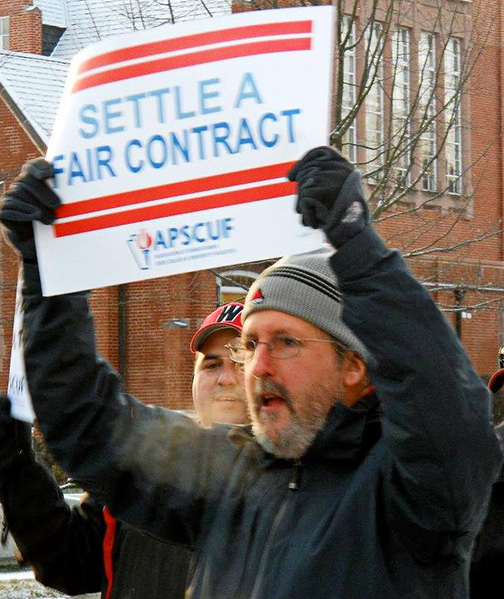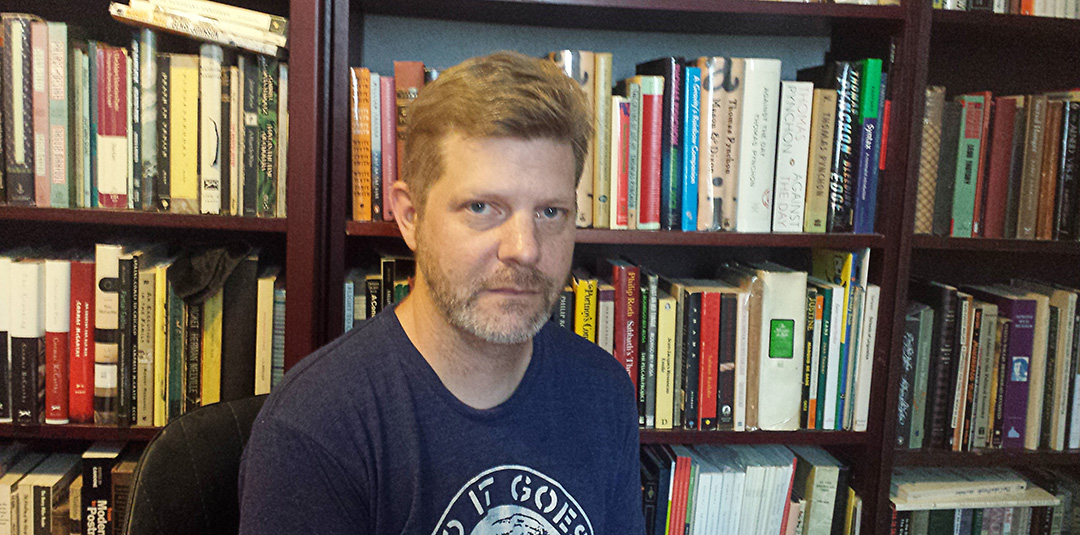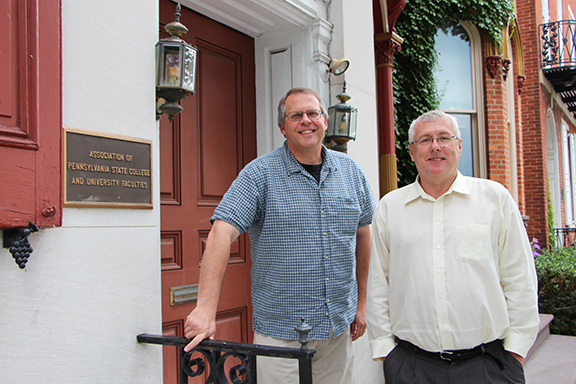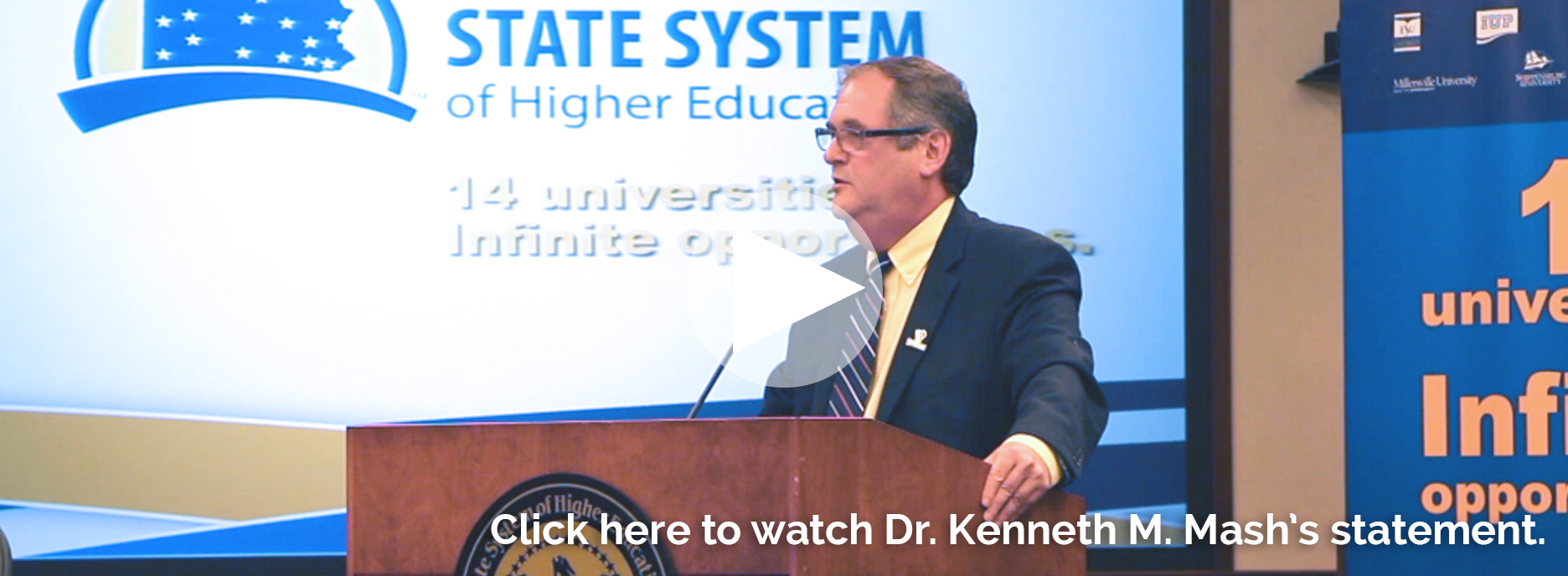Blog
APSCUF members are resolute and strong
Our guest post today is by Dr. Seth Kahn of West Chester University.

I had lunch the other day with a junior colleague on my campus during which we started discussing the current negotiations situation and what might happen in the event of a strike. At some point, she told me pretty plainly that she, and other people she’s friends with who are in their first few years, haven’t been reading the updates and newsletters coming from State APSCUF very carefully because the faculty have reached a point of saturation with the tone they hear coming from those of us in leadership positions (or who are just outspoken) over the last few years. The person I was with is strongly supportive of the union, but the way she put it, the people she’s talked to about the union have simply gotten to the point where they’ve shut down when they hear the “harsh” (her word) tone we often use in our communications.
Of course, my immediate reaction was to claim (and yes, I believe it) that the intention isn’t to sound that way at all, particularly in relation to the current negotiations, but instead to sound resolute and strong. I made that case, briefly, and it wasn’t entirely unsuccessful. But the conversation that followed made me realize three things. First, it doesn’t really matter what we intend if that’s not what you’re hearing. Second, what anger we do voice is often the result of years of managerial and political inattention to the realities of the system (as President Mash’s remarks to the Board of Governors from July 14 lay out). Third (and I never would have figured this out without my colleague’s conversation, especially for people who have only been in the system for a couple of years), the angst has been pretty relentless and has come to sound all the same — even when it isn’t.
It’s that third point I want to focus on for now. When I asked my colleague to say more about what she was hearing, her explanation began with the announcement and implementation of the mandatory-background-checks policy. She’s right. It was confusing trying to follow a policy that was oblique, complicated by the fact that it changed, complicated further by the fact that the timeline changed, and so on. By the time that situation settled down, or seemed to, the “activist” (As somebody who identifies as an activist, I want to wash my mouth out with soap after using the word to describe him.) who hates public unions had filed the sunshine-law request for our home addresses, which set off another hail storm of confusion, mandates, complaints, anxieties, conflicting responses, and in some cases pleas for advice that never got answered. (I’ll admit, by the way, to overreacting publicly to that situation; I was ready to go hard against that guy, and then realized I’d rather he know how to find me so I could see what he was sending people. But by then enough people had heard me screeching bloody murder about it that I don’t blame them for hearing “the union” reacting that way.)
By the end of our lunch conversation, my colleague had also helped me realize one other important thing. Not so much the background checks policy, but most certainly with regard to the home address request, what that guy really wanted to do was create tension within APSCUF. It worked — to an extent. People were mad, and people were scared, and people were confused. More to the point, people (leaders and members) were vocal about all those anxieties, for months, trailing off only in time for contract negotiations (or the lack thereof) to take the stage. And while the long-timers who have been through negotiations cycles are used to hearing an increasingly aggressive voice from State APSCUF when the State System bides their time waiting for … never mind that. I understand why people who haven’t been through it before have heard a pretty continuous supply of angst for a while now.
Knowing that, I hope you’re willing to start reading material that comes from State APSCUF again, especially as we head into a new semester. Contract negotiations are not moving as quickly as they should be, and we need to convince the State System to pick up the pace. In order to do that, we almost certainly will have to let them know that we are, in fact, angry at the way things have gone (or haven’t gone). Like anyone else, I’d have preferred that we could focus on our negotiations and other positive union work instead of responding to oblique and clearly inflammatory mandates designed to prevent us from getting real work done. If we’re going to make real progress in negotiations, we all must get on the same page, and in order to do that, we need everyone to hear this: We don’t want to strike, but we’re resolute that we will not accept a contract that harms our students, our system, and us.
Seth Kahn is an English professor at West Chester University.
Read Dr. Kenneth M. Mash’s remarks to the Board of Governors – July 14, 2016
Mr. Chairman, members of board, Chancellor Brogan,
My name is Kenneth Mash, and I am the president of the Association of Pennsylvania State College and University Faculties, which represents the over 5,500 faculty and coaches at the 14 universities comprising our system.
I listened carefully to yesterday’s finance committee meeting, and I found it disturbing for a number of reasons. I heard it said, after some significant anti-union rhetoric, that “we are all in this together.” I want to make it clear that our faculty and our coaches most decidedly do not feel like we are in this together.
We don’t feel like we are in it together when we consistently hear rhetoric about the rising costs of professors, when the numbers simply do not bear that out. It may fit an anti-union narrative, but it doesn’t fit the facts. The reality is that over the last five years, with only a couple of exceptions, the instructional costs at our universities have been either level or have decreased. Instructional costs, which includes salary and benefits, is not a number that we make up. It is a number that the System reports to the federal government and can be calculated with the System’s own data.
We do not feel like we are in it together when faculty are blamed for increased costs when a look at spending on non-auxiliary capital expenditures shows that at most of our universities there has been an increase in proportional use of E&G money — money that is used for instruction, spent on these non-auxiliary capital expenditures. There is a clear mythology to the notion that there is a separate capital budget. The fact that our association was ignored when we pointed out the risks associated with the type of borrowing that was done, and that this board approved with nary a question asked, does not make us feel like we are on the same page.
We do not feel like we are all in it together when amid the years of an 18 percent cut and the following years of zero increases we felt like lonely voices speaking up about the long-term damage that was being done to public higher education. When we feel alone walking the halls of the legislature speaking up for our institutions.
We do not feel like we are all in it together when we are consistently told that we need to sacrifice when it is our faculty and coaches who have to pick up the pieces when there are fewer people around to serve students because of cuts and attrition, when we are the ones who have to make up for the cuts to student support with additional individualized student attention, when we are the ones coping with larger class sizes while maintaining rigor, when we are the ones who have seen our department budgets slashed, all while we are the ones who actually deliver the quality education that you all so consistently speak about.
We do not feel like we are all in it together as shared governance continually gives way to authoritarian-style decision-making that we repeatedly demonstrate is not undergirded by rationality.
We do not feel like we are all in it together when are still told about the rising costs of healthcare when we know that those costs have decreased.
We do not feel like we are in it together when faculty and coaches are unfairly and counterfactually attacked during a legislative hearing and the administration of this System does not correct the record and in some instances abets misunderstanding. Even worse, there was not a single mention about the need for a larger state allocation, only bragging about how we can do more with less by putting everything on the table.
We do not feel like we are in it together when some of the highest-paid people in the Commonwealth take pride in proposing cuts to some of the lowest-paid members of our organization while they continue to take increases, including some double-digit increases.
We do not feel like we are in it together when we know that campus budget projections are widely exaggerated, we see that be borne out, and then we are told that we just do not understand.
We do not feel like we are in it together to try to find a resolution to a contract when after 15 months of negotiation, the State System suddenly decides to drop 249 proposed changes to our CBA.
We do not feel like we are in it together when we believe that those changes include provisions that will undercut the quality of education that we deliver and hurt our students’ prospects.
We do not feel like we are in it together when we hear officials beat up on academic disciplines without any clear understanding of the value of those disciplines.
We do not feel like we are in it together when there seems to be a consistent push to mimic the private sector, to use corporate jargon, and to downgrade the nobility of public higher education, even as private sector ventures into higher education are proven disastrous on a nearly daily basis.
I could continue on this list for the next hour, but I will resist the temptation. Needless to say that we do not feel like we are in it together when there is too often clear anti-union and anti-faculty rhetoric that is bandied about in casual and formal conversation at these meetings.
If we are to move anything close to being in it together, there is a lot of work to be done. My fear is that time for that is ticking away too quickly. We are committed to moving in the direction of working together, but that cannot occur when policy decisions are written in stone before any real conversation begins.
I am always available to any one of you to respond to questions, to discuss facts on the ground, and to enrich our mutual understandings of each other’s perspectives. And we invite each of you to come to our campuses to speak to those many faculty and coaches who would welcome the opportunity to have your ear.
Thank you for your attention.
APSCUF life: A typical Tuesday
This summer, APSCUF is going behind the scenes to show how faculty members and coaches continue to devote themselves to affordable, quality education even when class is not in session.

Jonathan Imber Shaw of Kutztown University says students come first. “They’re the reason I have a job in the first place,” the associate professor of English said.
During spring semester of 2016, I was up early on Tuesday mornings. By 5:30 a.m., I’d be on my second cup of coffee and on the road, driving out of my Center City Philadelphia neighborhood to get to the Schuykill Expressway ahead of rush-hour traffic.
By 7:45, I’d be in my office in Kutztown University’s Lytle Hall, answering emails from students, fine-tuning the day’s multimedia displays for class, drinking a third coffee. I always schedule an early morning office hour for my go-getter undergraduates. They stop by with essays in draft, with questions about assigned reading. This spring, I worked with an especially ambitious senior who was preparing materials for graduate school applications; we often met early in the day to talk about the process and strategize. I love those early-morning discussions with motivated students; they’re the best way to start the day.
Some mornings, I’d put a note on my door and go downstairs to my department chair’s office. We’d discuss department events, university politics, national trends, and policy in higher education. Sometimes we’d even talk about poetry — imagine that, for two professors of literature.
At 9:30, I’d teach my first class of the day, an undergraduate literature course for non-majors. The class meetings were 80 minutes long, and they would move quickly. The lecture and discussion sessions would be supplemented by multimedia displays, which take a couple hours to construct and refine, and most days I’d have between 80 and 140 pages of reading to prepare. I do all of that at home, on the weekend, and on evenings when I’m not reading and evaluating student essays.
At 11 a.m., I’d have a meeting. Sometimes a department meeting, sometimes a department or university committee. I sit on a total of six committees, all of which meet at least a couple times a month. Most are related to some aspect of department or university curriculum and academic programs. I also co-advise the English Club and the university chapter of Sigma Tau Delta, so if I’m not at a committee meeting, I drop in to keep up with club events and give what help I can.
At noon, 90 minutes of office time would commence. Most undergraduates prefer to see professors later in the day, so those 90 minutes would be full. There are always a million things I need to do — tasks for committees, planning for meetings, answering more emails, fine-tuning another multimedia display, my own research — but when a student knocks on my door, I drop everything. They come first. They’re the reason I have a job in the first place. I try to sneak lunch into downtime, but I usually end up eating while talking with a student. It’s not glamorous, but that’s the job.
At 1:30 p.m., three hours of teaching would start. I’d start with another section of the literature class for non-majors. The same lesson plan from the morning would need to be reconfigured for that section’s need and strengths. Following that, I’d have an 80-minute session of a special topics class in literary cultural studies for advanced English majors. Shifting gears, in less than ten minutes, from discussion with non-majors to much more intense, theoretical analysis with junior and senior majors is a real challenge. For the special topics class, I’d frequently be working from required readings, online materials, a PowerPoint display, some music, and perhaps an excerpt from a DVD from my collection. It’s a lot to coordinate, but it creates a rich environment for students’ intellectual development.
At 4:30, I’d be back in the office for another office hour. Many of our graduate students are working teachers, and, because we don’t have a lot of funding, many grad students need to hold some sort of day job. Scheduling time late in the day really helps them. And because many of their questions and needs relate to large and complex research projects, many of our conversations go beyond the scheduled hour. It stretches my day, but I value my intellectual relationships with my grad students. They’re smart, and they keep me on my toes.
That late start to my evening commute also means there’s no avoiding rush-hour traffic on my way home to Philadelphia. I usually get home at some point after 7 p.m. I spend an hour or so eating and checking in with my two school-age children and with my wife, who’s also a busy professional. After 8 or 8:30, it’s back to the books for another couple of hours of prep or, more often, I grab a stack of essays to work through.
And that’s Tuesday. Seventeen hours of work and commute in one day of my week.
Jonathan Imber Shaw is an associate professor of English at Kutztown University.
New coach takes helm while outgoing leader continues efforts

New Coach Executive Leader John Gump, left, and former CEL Keith White outside the APSCUF office in Harrisburg. Photo/Kathryn Morton
Coach Keith White knew something needed to change — for him at Kutztown University and for the other coaches in the Pennsylvania State System of Higher Education. Coaches lacked formal representation, and he was shocked to see a number of quality State System coaches being let go for no apparent reason. So, more than 14 years ago, White became one of the founding members of coach representation in the Association of Pennsylvania State College and University Faculties.
This year, White stepped down as coach executive leader, citing recent health issues and an even stronger desire to see a younger coach take the position. Despite the change, White is looking forward to remaining highly involved in his union to ensure that coaches will continue to be treated fairly. White said he encourages coaches who are not members of APSCUF to take advantage of this “unique opportunity,” as APSCUF was the first union to organize non-faculty athletic coaches in a public higher education system. White recalled a time when he had to negotiate for himself, and he pointed out how important it is that coaches have someone who can negotiate for them.
White offered advice to the coaches’ new executive leader, John Gump, also of Kutztown University.
“Look at what the union can do for the membership,” White said.
Serving the whole unit is one the most valuable things a coach executive leader can do for his members, White added.
Like White, Gump has been a part of APSCUF since the coaches gained representation.
He was inspired to take on this new leadership position after seeing several individuals — including White — actively pursue the coaches’ interests. APSCUF has played an important role in Gump’s career, he said, and he emphasized how important it is for coaches to be united.
“We’re coaches,” Gump said. “We believe in teams.”
Gump was coach president at Kutztown for the past two years, and he is looking forward to increased contact with his colleagues across the 14 campuses, he said.
Gump said he plans to reach out personally to nonmembers and new hires to make them aware of membership benefits and key issues that concern them.
“With votes looming on a variety of issues, it’s important to have as many voices participating in that decision-making as possible,” he said.
Following White will be a “daunting task,” Gump said, since White was APSCUF’s first coach executive leader.
However, he is also thankful for the opportunity to take on this new role and was quick to mention that he will seek advice from White as he proceeds, Gump said.
“I will do my very best, and I assure you there will be a well-worn path between my office door and his,” he said.
—Corrinne Rebuck, APSCUF intern
APSCUF life: There’s always work to do
This summer, APSCUF is going behind the scenes to show how faculty members and coaches continue to devote themselves to affordable, quality education even when class is not in session.

Dr. Jonathan Rothermel promised his daughter he would bring this stuffed animal on a study-abroad trip to Belize. He displays Kitty at the Mayan site of Xunantunich.
Dr. Jonathan Rothermel often grades while his daughter is in dance class. Or the dad of two, a political-science professor at Mansfield University, rises early to prepare for the day while the rest of his family sleeps.
Despite the extra hours Rothermel must put in to keep up with his various work responsibilities, he said he is thankful for a position that allows him a degree of flexibility in balancing his personal and professional lives.
“I am blessed with a great job that does not necessarily require me to be in a particular place for 40-plus hours a week,” he said.
Rothermel’s profession entails much more than a simple 40-hour workweek, with a large amount of his personal time being spent preparing, catching up, and grading.
Upon his arrival at Mansfield University in 2008, Rothermel was surprised at how much time he spent working outside the classroom — on both his primary duties and additional responsibilities. For the past two years, Rothermel has served as vice president for the university senate while juggling an average of four classes per semester. Recently, he was promoted to president of the university senate. He has also been an active member of multiple campus organizations and committees that require additional meeting times and responsibilities. Every week, Rothermel must attend four to five meetings that cover a broad range of administrative tasks outside the realm of his traditional classroom responsibilities.
And then there’s “always” grading to do, Rothermel said.
While decreasing the amount of coursework he assigns would cut the time Rothermel spends grading, he believes multiple assignments give students “as many opportunities as they can to succeed.” And Rothermel enjoys seeing his students succeed in his class, he said.
Advising students — both formally and informally — is another time-consuming responsibility for Rothermel. Informal advising, Rothermel explained, takes much more time but is also one of the most enjoyable parts of his job. Despite juggling his daily tasks, Rothermel does not put a time limit on his students.
“You cannot predict when you will be needed to put out fires or offer an empathetic ear,” he said.
One aspect Rothermel most enjoys about his job is the frequent contact with his students, he said.
“My students embody the fruits of my labor, and as I tell my students often, I get to live vicariously through them,” he said.
One of the most common phrases in Rothermel’s household is, “Daddy is in his den doing work.” Although his profession can prove challenging with the numerous responsibilities and the extra dedication associated with his tasks, Rothermel said he finds the rewards especially enjoyable.
“My job as a university professor is what defines me, and my family respects this and has been gracious about sharing me with my students,” he said.
—Corrinne Rebuck, APSCUF intern
